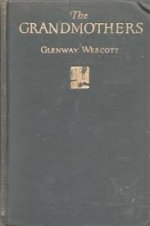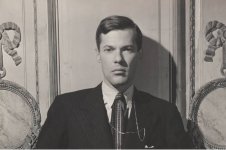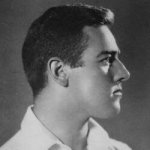After the Great War there were a number of literary figures from America given over to, to some degree, the expatriate life in Europe, notably Paris. Names such as Gertrude Stein, F. Scott Fitzgerald and Ernest Hemingway. John Dos Passos, too. But, amongst all these heavyweights, what of the lesser known figures of this time? Glenway Wescott was one, having mixed with the aforementioned, and his legacy seems slight in comparison. In all he only wrote three novels, publishing only essays and journals for the rest of his life, which spanned a further forty years.
The Pilgrim Hawk (1940), then, is the second of Wescott's novels and bears the subtitle of A Love Story. Yet the love within is not as simple as man loves woman, woman loves man, with a happy ending, but features a more interesting triangle, something which is obviously significant - and memorable - for our narrator, Alwyn Tower, as he is still musing over it years later, given how small a slice of his life it was:
It's easy to see Lucy as a symbol, especially given how much the nature of her species is talked about: through freedom to dependence, of fertility and fecklessness. That she's not a recurring motif but one of the novel's major players that comes to represent all those around her makes The Pilgrim Hawk special and a shrewd piece of writing. At one level the hood she wears to keep her calm and docile highlights the upper class's ignorance-is-bliss mentality is thumpingly obvious; yet, more subtly done, is the way each of her characteristics comes to embody one or other of the players, including Tower, unlucky in love, even in the intervening years:
The Pilgrim Hawk (1940), then, is the second of Wescott's novels and bears the subtitle of A Love Story. Yet the love within is not as simple as man loves woman, woman loves man, with a happy ending, but features a more interesting triangle, something which is obviously significant - and memorable - for our narrator, Alwyn Tower, as he is still musing over it years later, given how small a slice of his life it was:
"the twenties were very different from the thirties, and now the forties have begun. In the twenties it was not unusual to meet foreigners in some country as foreign to them as to you, your peregrination just crossing theirs; and you did your best to know them in an afternoon or so; and perhaps you called that little lightning knowledge, friendship."
This 'little lightning knowledge' applies to the Cullens, an Irish man with an English wife, who Tower describes as 'self-absorbed, coldly gregarious, mere passers of time.' And passing time seems to be what they do best, since they are just stopping off at Tower's friend Alexandra's house, in Paris, on their way to Hungary. But with them, bizarrely, is Mrs Cullen's peregrine falcon, Lucy, captured in Scotland to satisfying her latest whim of falconry. The bird looms large throughout the story, well observed by Tower, with every detail of its plummage recounted, none of its actions passing without note - although the better passages are when its closeness to humanity is considered:"her chief beauty was that of expression. It was like a little flame; it caught and compelled your attention like that, although it did not flicker and there was nothing bright about it nor any warmth in it. It is a look that men sometimes have; men of great energy, whose appetite or vocation has kept them absorbed every instant all their lives. They may be good men but they are often mistaken for evil men, and vice versa. In Lucy's case it appeared chiefly in her eyes, not black but funereally brown, and extravagantly large, set deep in her flattened head."
As the afternoon progresses at Alexandra's, it becomes clear that Lucy is the third player in the Cullens' marriage and as the drinks start pouring, tongues loosen, and pleasantries slip by the wayside. In addition to the drama going on amongst the upper classes, there's action off the set, too, as the Cullen's chauffeur mingles with the house staff and love amongst the lower classes is also explored.It's easy to see Lucy as a symbol, especially given how much the nature of her species is talked about: through freedom to dependence, of fertility and fecklessness. That she's not a recurring motif but one of the novel's major players that comes to represent all those around her makes The Pilgrim Hawk special and a shrewd piece of writing. At one level the hood she wears to keep her calm and docile highlights the upper class's ignorance-is-bliss mentality is thumpingly obvious; yet, more subtly done, is the way each of her characteristics comes to embody one or other of the players, including Tower, unlucky in love, even in the intervening years:
"Life goes on and on after one's luck has run out. Youthfulness persists, alas, long after one has ceased to be young. Love-life goes on indefinitely, with less and less likelihood of being loved, less and less ability to love, and the stomach-ache of love still as sharp as ever. The old bachelor is like an old hawk."
That the novel occurs over such a short period it's a wonder that Wescott has managed to stretch it out to just over one hundred pages, but the voice he gives to Tower ensures a lazy, measured tone, never hurrying past a scene and recounting it in all its beauty; at times philosophical but always, like a hawk, observant. One can't help wonder if with Tower's feeling of being a failed novelist, Tower is Wescott, and perhaps the further novel after The Pilgrim Hawk is an embodiment of that fear, leading to Wescott's giving up of fiction. But either way, I think we can consider this erstwhile member of the lost generation well and truly found again.


